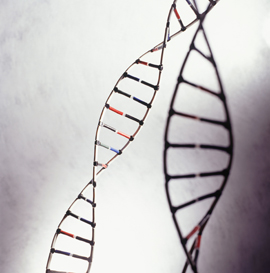NIH-funded study describes strategy that activates silenced genes

WHAT:
Drugs capable of activating silenced genes improve survival and growth outcomes in a mouse model of Prader-Willi syndrome (PWS), a rare and incurable childhood disease, according to a study funded by the National Institutes of Health (NIH). PWS occurs in 1 in every 15,000 to 25,000 live births, equally affecting boys and girls. The genetic disorder can lead to life-threatening obesity in children. It also can cause physical, intellectual, behavioral and psychiatric symptoms. The study is supported in part by NIH’s Eunice Kennedy Shriver National Institute of Child Health and Human Development (NICHD).
Genetic information passes to a child in a pair of chromosomes—one from the father and one from the mother. PWS is caused by genetic changes along a section of chromosome 15 called the Prader-Willi critical region. Under normal circumstances, genes in this region are inactive, or silenced, on maternal chromosome 15 but active on paternal chromosome 15. In PWS, however, the critical region on the paternal chromosome either is inactive or missing. Infants with PWS fail to thrive and have altered metabolisms and trouble feeding. However, as they get older, they become compulsive overeaters.
In the study, researchers found two drugs, called UNC0638 and UNC0642, capable of activating maternal PWS genes in cells from a patient. They targeted maternal genes because, unlike paternal genes, they are consistently available in PWS patients. The study team then tested UNC0642, which had more favorable pharmacological features, in a mouse model of PWS. These mice grow poorly, like infants with PWS, and do not survive. The experimental drug activated maternal PWS genes, and the treated mice had better growth and weight gain than untreated mice, with 15 percent surviving to adulthood without serious side effects.
UNC0638 and UNC0642 work by inhibiting the activity of a protein called G9a, which together with other proteins packs the maternal genes tightly in the chromosome. Overall, the study shows that this type of therapy may be beneficial for treating PWS, but researchers will need to evaluate the drugs’ effects on other disease symptoms, such as compulsive overeating and obesity.
Additional support for this study was provided by NIH’s National Institute of General Medical Sciences and the Foundation for Prader-Willi Syndrome Research.
ARTICLE: Kim Y, Lee HM, Xiong Y, Sciaky N, Hulbert SW, Cao X, Everitt JI, Jin J, Roth BL, and Jiang YH. Targeting the histone methyltransferase G9a activates imprinted genes and improves survival of a mouse model of Prader–Willi syndrome. Nature Medicine DOI:10.1038/nm.4257 (2016).
###
About the Eunice Kennedy Shriver National Institute of Child Health and Human Development (NICHD): NICHD conducts and supports research in the United States and throughout the world on fetal, infant and child development; maternal, child and family health; reproductive biology and population issues; and medical rehabilitation. For more information, visit NICHD’s website.
About the National Institutes of Health (NIH): NIH, the nation's medical research agency, includes 27 Institutes and Centers and is a component of the U.S. Department of Health and Human Services. NIH is the primary federal agency conducting and supporting basic, clinical, and translational medical research, and is investigating the causes, treatments, and cures for both common and rare diseases. For more information about NIH and its programs, visit http://www.nih.gov.

 BACK TO TOP
BACK TO TOP